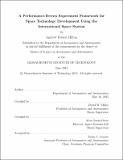A performance-driven experiment framework for space technology development using the International Space Station
Author(s)
Hilton, Andrew Robert
DownloadFull printable version (13.21Mb)
Other Contributors
Massachusetts Institute of Technology. Department of Aeronautics and Astronautics.
Advisor
David W. Miller and Alvar Saenz-Otero.
Terms of use
Metadata
Show full item recordAbstract
Space systems are inherently difficult to verify prior to launch due to the challenges of replicating the space environment through ground testing. The SPHERES testbed on the International Space Station has provided a risk-tolerant test facility for evaluating enabling technology. The operational execution of the SPHERES facility has resulted in the development of best practices for working with experiments in the operational space environment that can be continually refined through successive generations of SPHERES projects. This thesis presents an experiment framework for developing space technology using the International Space Station that focuses on incrementally building toward technology demonstration through the achievement of specific results at each step that are designed to enable an effective demonstration. The operational nature of the ISS constrains both the time available for testing and the control that the scientist can exercise over the experiment. Therefore, this framework addresses the need to design experiment campaigns that can eciently achieve the desired results using data gathered from tests that exhibit unexpected behavior in addition to the tests that exhibit expected behavior. The framework is inspired by the lessons learned from the RINGS project, an attachment to the SPHERES facility that tests Electromagnetic Formation Flight using electromagnetic coils attached to the vehicle. The RINGS experiment campaign is reviewed with a focus on the lessons learned from the operational phase of the project. From these lessons, the experiment framework is developed and presented so that researchers can have a guide in the planning and designing of their experiments for use on remote, operational facilities. The framework is then applied to the next-generation SPHERES project, the Universal Docking Port, as well as the RINGS project, in order provide examples of how this framework can be implemented.
Description
Thesis: S.M., Massachusetts Institute of Technology, Department of Aeronautics and Astronautics, 2015. This electronic version was submitted by the student author. The certified thesis is available in the Institute Archives and Special Collections. Cataloged from student-submitted PDF version of thesis. Includes bibliographical references (pages 117-120).
Date issued
2015Department
Massachusetts Institute of Technology. Department of Aeronautics and AstronauticsPublisher
Massachusetts Institute of Technology
Keywords
Aeronautics and Astronautics.